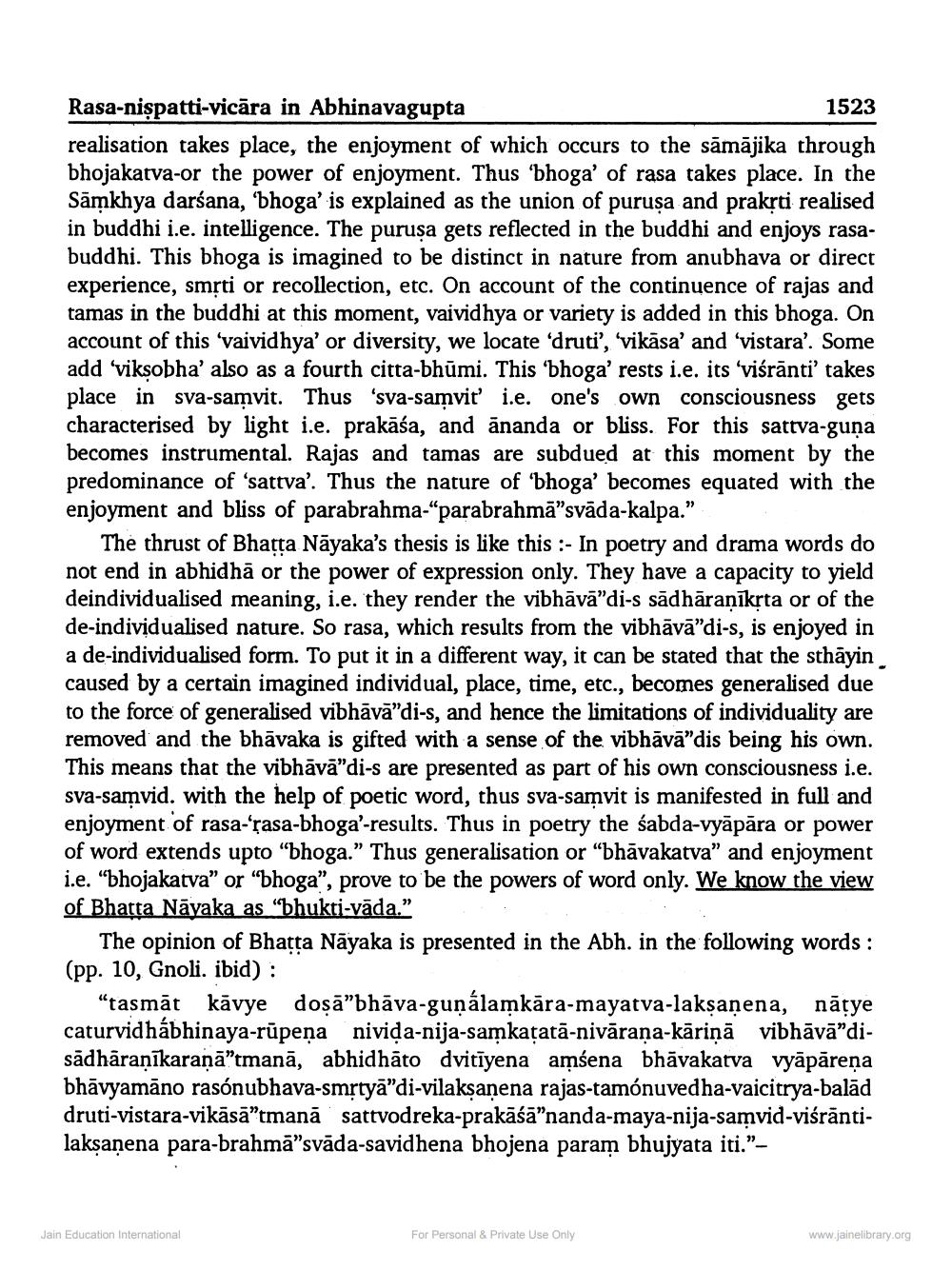________________
Rasa-nispatti-vicāra in Abhinavagupta
1523 realisation takes place, the enjoyment of which occurs to the sāmājika through bhojakarva-or the power of enjoyment. Thus 'bhoga' of rasa takes place. In Sāmkhya darśana, 'bhoga' is explained as the union of purusa and praksti realised in buddhi i.e. intelligence. The purusa gets reflected in the buddhi and enjoys rasabuddhi. This bhoga is imagined to be distinct in nature from anubhava or direct experience, smrti or recollection, etc. On account of the continuence of rajas and tamas in the buddhi at this moment, vaividhya or variety is added in this bhoga. On account of this 'vaividhya' or diversity, we locate druti', 'vikāsa' and 'vistara'. Some add 'viksobha' also as a fourth citta-bhūmi. This 'bhoga' rests i.e. its 'viśrānti' takes place in sva-samvit. Thus 'sva-samvit' i.e. one's own consciousness gets characterised by light i.e. prakāśa, and ananda or bliss. For this sattva-guna becomes instrumental. Rajas and tamas are subdued at this moment by the predominance of 'sattva'. Thus the nature of 'bhoga' becomes equated with the enjoyment and bliss of parabrahma-“parabrahmā”svāda-kalpa."
The thrust of Bhatta Nāyaka's thesis is like this :- In poetry and drama words do not end in abhidhā or the power of expression only. They have a capacity to yield deindividualised meaning, i.e. they render the vibhāvā"di-s sādhāranīkrta or of de-individualised nature. So rasa, which results from the vibhāvā"di-s, is enjoyed in a de-individualised form. To put it in a different way, it can be stated that the sthāyin caused by a certain imagined individual, place, time, etc., becomes generalised due to the force of generalised vibhāvā"di-s, and hence the limitations of individuality are removed and the bhāvaka is gifted with a sense of the vibhāvā"dis being his own. This means that the vibhāvā"di-s are presented as part of his own consciousness i.e. sva-samvid. with the help of poetic word, thus sva-samvit is manifested in full and enjoyment of rasa-rasa-bhoga'-results. Thus in poetry the sabda-vyāpāra or power of word extends upto "bhoga." Thus generalisation or "bhāvakatva" and enjoyment i.e. "bhojakatva" or "bhoga", prove to be the powers of word only. We know the view of Bhatta Nāyaka as “bhukti-vāda.”
The opinion of Bhatta Nāyaka is presented in the Abh. in the following words : (pp. 10, Gnoli. ibid):
"tasmāt kāvye dosā”bhāva-gunálamkāra-mayatva-lakṣaṇena, nāțye caturvidhábhinaya-rūpena nivida-nija-samkatatā-nivārana-kārinā vibhāvā”disādhāraṇīkaranā”tmanā, abhidhāto dvitīyena amśena bhāvakarva vyāpāreņa bhāvyamāno rasónubhava-smrtyā"di-vilaksanena rajas-tamónuvedha-vaicitrya-balād druti-vistara-vikāsā”tmanā sattvodreka-prakāśa”nanda-maya-nija-samvid-vibrāntilaksanena para-brahmā"svāda-savidhena bhojena param bhujyata iti.”
Jain Education International
For Personal & Private Use Only
www.jainelibrary.org




